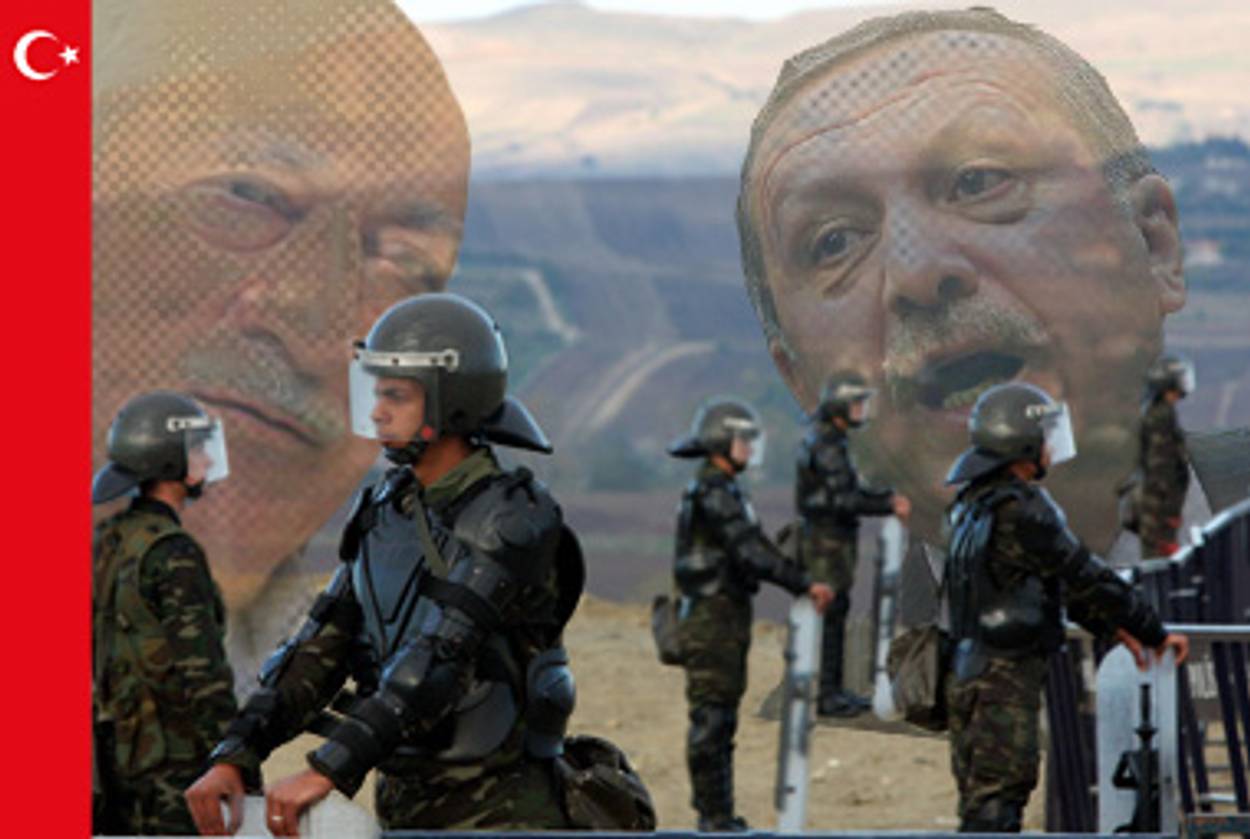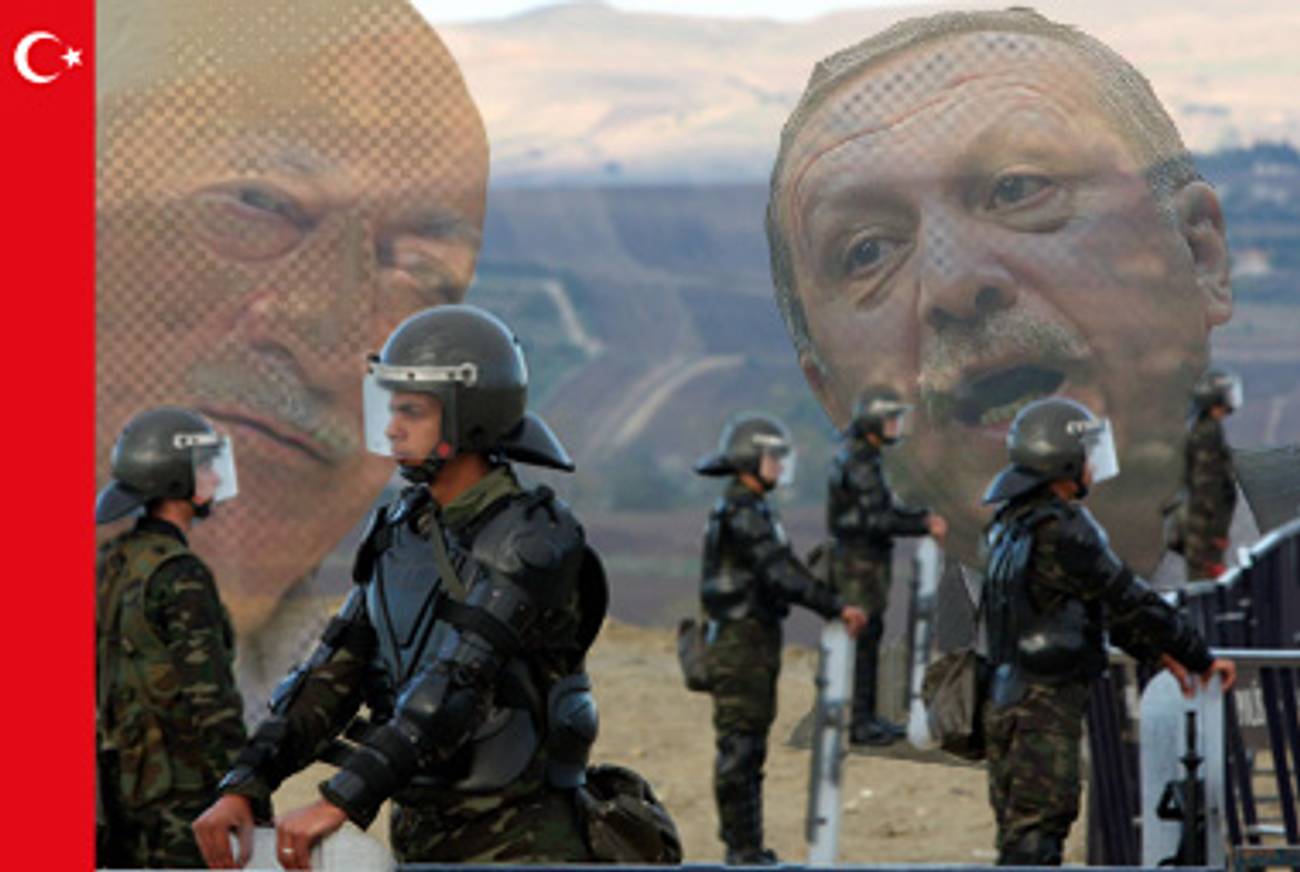Veiled Threat
In Turkey, Washington’s great example of Muslim democracy, the ruling party alleges conspiracy to attack the opposition and crush dissent




Some U.S. policymakers believe that Turkey is the future of Islamic democracy and that no political institution better exemplifies the desired hybrid of Western practice and religious values than the country’s ruling Justice and Development Party. To be sure, the party, known by its Turkish initials AKP, is culturally more conservative than the secularists and military elite who have governed from Ankara since Mustafa Kemal, or Ataturk, dispensed with the caliphate and made Islam a personal affair in the country rather than a political one. And now the AKP says it’s under siege from its Kemalist rivals in the military and other Turkish institutions—including the judiciary, the press, and non-government organizations—who seek to regain power by overthrowing the democratically elected government of Turkey. Their instrument for doing so, says the AKP, is Ergenekon.
Ergenekon is the name given to a massive clandestine organization that the AKP says has plotted a host of conspiracies including plans to crash airplanes and bomb Istanbul mosques in the hopes of precipitating a military coup. The Turkish authorities have used these allegations to arrest hundreds of people who oppose Prime Minister Recep Tayyip Erdogan’s government—arrests that have been greeted in the West with confused silence.
However, according to Dani Rodrik, a Turkish academic now based in the United States, Ergenekon is not a threat to Turkey’s increasingly Islamist form of democracy but rather an elaborate political fiction created by the AKP and its ally, the mysterious billionaire religious leader Fethullah Gulen, in order to discredit, imprison, and silence opponents. Rodrik believes that the AKP and the Gulenists are looking to consolidate their power not just with a view to short-term political victories, but as part of a vision to change the nature of the fiercely secular Turkish republic. “You get a different perspective on what they’re doing internationally once you understand what they’re doing at home,” Rodrik told me by phone this week. “The AKP and its Gulenist allies are authoritarian at heart, one by one capturing state institutions and undermining the rule of law. What you’re going to get is not a more democratic Turkey.”
Rodrik, the 52-year-old Rafiq Hariri Professor of International Political Economy at Harvard’s John F. Kennedy School of Government, is best known for his views on trade policy and the developing world. What does a Harvard economist who makes his home in the United States know about the pitched battle between the military and the Islamist political establishment in a proudly Muslim country? The fact that Rodrik is a member of Turkey’s dwindling Jewish community makes his charges against the AKP and Gulenists suspect to some. “There’s been a level of predictable anti-Semitism in some of the government-friendly media,” Rodrik said. “But it is important for the government to have the liberal intelligentsia with them on this, and persistent anti-Semitism rants wouldn’t go over very well with them.”
Still, this is not the same Turkey that once enjoyed a strategic alliance with Israel. The Turkish-sponsored Mavi Marmara dispatched to Gaza in May suggests that Ankara has instead joined the ranks of the resistance axis, a strange decision for one of Washington’s NATO allies. The writing was on the wall as early as March 2003, shortly after Erdogan took office, when the Turkish parliament rejected the George W. Bush Administration’s request to use Turkey as a launching ground for the invasion of Iraq.
If U.S. officials were slow to chart Turkey’s shift in the international arena, they have been oblivious to the mounting domestic crisis driving the Ergenekon affair. Rodrik himself wasn’t paying especially close attention to the spiral of weird conspiracy cases that have taken over the Turkish justice system until a relative was named in one of the many Ergenekon trials, this one related to allegations of a 2003 anti-government plot known as Sledgehammer. “When these cases came out three years ago,” Rodrik said, “I was where most Turkish liberals are today. I thought, maybe there were some improprieties in the way they were handled, but essentially the government was moving in the best way possible.”
In January a Turkish newspaper began publishing documents produced by an anonymous individual who claimed to be a retired military officer with knowledge of the Sledgehammer plan to bring down the government. Close to 200 active-duty and retired military officers have been charged as conspirators—for plotting terrorist operations like the mosque bombings intended to destabilize the state—all allegedly under the orders of retired four-star general Çetin Doğan, Rodrik’s father-in-law.
“I was skeptical from the beginning that he could be involved in such a thing,” Rodrik told me. “It’s horrifying stuff. Later, I became certain the documents were fabricated.”
What Rodrik and his wife found, he said, were obvious forgeries, clear to anyone “with a working command of Turkish.” The case is based on documents loaded onto three CDs, with no direct evidence tying them to computers where they are said to have been produced by Turkey’s First Army. As Rodrik has written: “Not a single one of the hundreds of officers questioned in the case has acknowledged ever hearing of the Sledgehammer plot or any of the other plans included in the incriminating CDs. The evidence that the three CDs in question are authentic comes solely from their metadata: the username and time information contained on the CDs and the Word documents therein. According to these metadata, the documents and the CDs were produced in 2003.”
It hardly takes a tech expert to alter such metadata, and according to Rodrik it is obvious that these documents could not have been made in 2003 but were produced sometime after, perhaps as late as 2008. Among other glaring anomalies is the fact that some of the organizations named did not exist when the plot was supposedly hatched. Journalists ostensibly blacklisted by the Sledgehammer conspirators were not writing about political issues at the time—one was a food critic, hardly an obvious target in a coup attempt.
“There are many reasons to be suspicious of the authenticity of the documents,” Rodrik told me. “But the zinger is that they are full of references to events that happened after 2003, literally dozens of these things. For instance, the documents mention a hospital by the name it uses after it merged with another hospital in 2008, they mention a company by the name that it took after it was sold to a foreign investor in 2008. Even without these anachronisms, there are enough inconsistencies that the case wouldn’t have gone forward in any legal system that takes the presumption of innocence seriously. But the anachronisms establish conclusively that the defendants have been framed.”
However, the legal system seems to be part of the problem. “Some crimes are based on evidence fabricated by the national police with the connivance of prosecutors,” said Rodrik. For instance, when an anonymous tip led the police to seize a DVD from a retired naval major’s house, the initial report, Rodrick wrote, “found nothing suspicious on the DVD, but a subsequent technical analysis uncovered a hidden file with details of a plan to intimidate non-Muslim minorities through bombings and assassinations. … Unaccountably, the prosecutors are on record questioning another defendant on this hidden file days before the technical analysis was conducted and the file was ‘discovered.’ ”
If the case against his father-in-law and the other alleged Sledgehammer conspirators is so patently flimsy, why, I asked him, isn’t anyone else doing the detective work he and his wife did? Those Turks most inclined to get in the weeds with him are the media and the liberal intelligentsia, are they are either too scared to say anything, said Rodrik, or they side with the AKP and the Gulenists.
Much of the Turkish media is owned by or affiliated with Fethullah Gulen, the supposedly charismatic but largely silent religious figure who has made his home in Pennsylvania since the late 1990s and is closely allied with the AKP. Gulen’s criticism of Ankara over the Mavi Marmara incident suggested to some that a breach had opened between his movement and the AKP, but Rodrik disagrees. “The criticism caught his domestic supporters off guard, because the local Gulenists are all on board with the IHH,” said Rodrik, referring to the Istanbul-based charity with ties to Islamic terrorist organizations, including Hamas. Gulen had good reason for seeing the incident from Washington’s point of view. “What’s important for Gulen is to be on the good side of the U.S. government.”
The AKP and the Gulenists, Rodrik explained, “are interlocking but independent. The Gulenists are an opaque movement. What they stand for is broadly in line with what the AKP wants: a culturally much more conservative Turkey, religious values, and practices. It’s an alliance based on perception of common interests. You can’t tell what’s happening in the Ergenekon affair without accounting for the role of the Gulen movement. The people who are responsible for fabricating evidence, intimidation, and wire-tapping, these are supporters of Gulen.”
The fact that the AKP is a broader umbrella than the Gulen movement, Rodrik argued, is yet another factor in keeping the Sledgehammer case rolling. “The AKP is supported by many liberals, who agree with them on issues of personal freedom, like the headscarf,” he explained. Sledgehammer and other cases that suggest a military plot to destroy Turkish democracy dovetail perfectly with the anti-military sentiment of secularists and liberals who might otherwise be worried by the AKP’s religious bent. “Liberals are anxious to see the military brought down to size,” said Rodrik. “And it’s true that they’ve been involved in some stuff in the past that’s not pretty. So with this narrative already in liberals’ heads, the case has been stage-managed extremely well.”
The storyline happens to fit the preconceptions of most U.S. officials as well. “Washington sees it something like this: The Turkish military and its allies have become too powerful, and now the AKP is trying to liberate the democratic system. This is a process of a deepening of democracy,” Rodrik said. “The narrative is very appealing on the surface. In Washington, I’ve been told it will change only with the arrest of U.S. citizens.”
In addition, Gulen’s public-relations apparatus reaches inside the Beltway. “Gulen encourages his devotees to contribute to members of Congress. When his supporters do an event in D.C., scores of congressmen show up. I have been told members of Congress go fishing on his compound in Pennsylvania,” Rodrik said. “You won’t see Gulen’s name on things, but he commands a vast network of schools, business associations, charities, and media outlets. It’s quite remarkable, how wide and influential this network is.”
To many U.S. officials then, Gulen is the model moderate Muslim, a Sufi who preaches coexistence and cooperation with the West—even as it is the Gulenists who are making war against the United States and Israel’s traditional allies in the Turkish military. But since Sept. 11, U.S. policymakers of both parties have been so giddy at the prospect of Islamic democracy that they have given a free pass to anyone clever enough to cloak their actions and intentions in the cloth of moderate Islam. The fact is that Erdogan and his allies are running roughshod over fundamental democratic principles—which is to say that the problem with Islamic democracy isn’t Islam as such, but rather the corruption and conspiracies of the governing party and its allies, who use Islam as cover for their own hunger for power. Washington, meanwhile, doesn’t dare criticize the domestic machinations of a Muslim democracy’s ruling Islamist party, for fear of crashing its own plans, and alienating Muslims.
Click here to view all articles in this series.
Lee Smith is the author of The Consequences of Syria.
Lee Smith is the author of The Permanent Coup: How Enemies Foreign and Domestic Targeted the American President (2020).